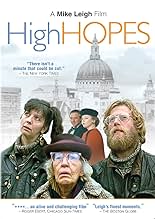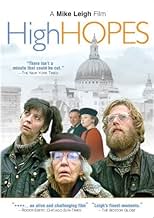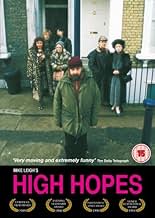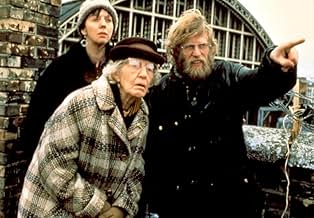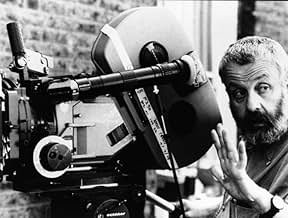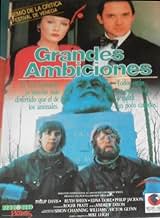Dans le Londres brumeux de la fin des années 1980, un jeune socialiste est désespéré par sa mère, ouvrière vieillissante et conservatrice, par ses amis snobs de la classe moyenne et par sa f... Tout lireDans le Londres brumeux de la fin des années 1980, un jeune socialiste est désespéré par sa mère, ouvrière vieillissante et conservatrice, par ses amis snobs de la classe moyenne et par sa femme qui ne pense qu'à fonder une famille.Dans le Londres brumeux de la fin des années 1980, un jeune socialiste est désespéré par sa mère, ouvrière vieillissante et conservatrice, par ses amis snobs de la classe moyenne et par sa femme qui ne pense qu'à fonder une famille.
- Réalisation
- Scénario
- Casting principal
- Récompenses
- 6 victoires et 6 nominations au total
- Cyril
- (as Philip Davis)
- Man in Street
- (non crédité)
Avis à la une
"High Hopes" is a slice of life type film in which there is little plot, but rather a series of events that serve almost as a two hour long snapshot taken at a very specific time in the main characters' lives. While there are many interconnected characters displayed, each with their own mini story arc that can range from light comedy to dark tragedy to somewhere in between, at the center of the film is a likable young couple. A political undercurrent runs throughout the final half hour of the film dealing with the state of England under Margaret Thatcher and the beliefs of a socialist and Marxist, which is all quite interesting even if it makes the film somewhat outdated (but, with me, that isn't much of a problem); however, the film, in the end, is no so much about politics and ideology, but more so about the human spirit and its many triumphs and failures, life and it's many ups and downs. I fell in love with some of the characters in this film, and always felt deep care and concern for them. One shot in particular will always remain in my memory; it is the haunting image of an elderly women on her seventieth birthday as her family explodes (not literally) into chaos behind her. We can only see the elderly women, and we can only hear her screaming, bickering family members under the melancholic sounds of the film's often bleak score. This fragile lady is left to do no less than stare into nothingness, a fragile victim of the world's evils. But...this film is not a hopeless tragedy; rather, it is a hopeful comedy in the end, for, in the end, positivity seems to conquer the tears and tragedies that plagued the film in earlier moments (although not EVERY character seems to receive a "happy ending").
This film is a(n often darkly) humorous look into the lives of some very realistic and unique individuals as they struggle and smile through life. It is a film about love, compassion, strength, weakness, loneliness, politics, society, intimacies, and more. A beautiful feat of comic and dramatic filmmaking that sadly remains overlooked and obscure to this very day; fortunately, Mike Leigh was still rewarded in later years with a reasonably successful and highly praised career made up of many movies critics claim to be masterpieces, many movies that I now cannot wait to get my hands on!
However Dore, who does virtually nothing, is quietly magnificent as the mother whose life has evaporated in front of her eyes and Philip Davis and Ruth Sheen are heartbreakingly real as the socialist son and the woman he loves but not enough to give her the child she craves. Indeed, Davis and Sheen give the kind of performances that seem to transcend mere 'acting' and which in a just world would be showered with prizes. (Sheen and Dore did win European Film Awards). In fact, everyone is first-rate even the caricatured neighbours and the lamentable Valerie. An uneven work, then, but when Davis and Sheen are on screen it's as good as Leigh gets.
Director Mike Leigh is probably the closest the UK has to Woody Allen: and like Allen his films go from absolute classics to barely watchable. Here he is about as good as he ever will be - indeed there are scenes from this movie that are, in there own way, as profound and original as anything that has been put down on film.
Who else would let the camera linger on the face of an old woman just at the point of losing her sanity? Or dare to present a couple going nowhere as the centrepiece of a feature film? Or even present "success stories" (a yuppie couple) as rank and selfish? Here lower-middle-and-upper crusts are clowns, it is only a matter of levels and angles.
Indeed, Leigh never gives us anything to cling to. Nor does he want to present hope that things will change for the better. Take the central couple Shirley and Cyril (Philip Davies and Ruth Sheen). Why are they living like squatters in their own tiny flat? Why can they not buy a proper bed (they sleep on the floor) or look for somewhere better - after all they both work? Apart from the question of a child (she wants - he doesn't) they both seem happy to live in squalor. In Shirley we at least have someone who cares for other people.
The old lady - through which the story is told - is on her last legs as regards living an independent life. The house she lives in has become neglected and the area she lives in no longer contain her type of people. Her neurotic daughter is so wrapped up in her own suburban life that she does seem to realise her mother is at the point of collapse. The scene where she holds a birthday party for her aged mother is agony - not for her confused mother - but for us the viewer.
Some of the performances are a little of the top (Leigh's films let actors improvise) and I could have lived without so much of the melancholy music track that rubs everything in. But this is the only film since One Flew Over The Cuckoo's Nest that lets humour and tragedy sit side by side without blinking.
Director Leigh gets under your skin and takes you places we haven't been on film before - but I am not sure they are places I would want to go on a regular basis. He is a one-off, but I am secretly glad about that.
I really liked this film, it centres on one extended family living in London during the Thatcher years. Cyril is a Marxist, who does despite his strong values and views chooses not to act on them, giving the world up for a hopeless cause. His partner, Shirley, desperately wants a baby, despite Cyril's strong views that the world is already "over-populated". Living in the last council house on a now yuppie infested road is Cyril's mum. A member of the generation who has been forgotten, she is slowly losing her marbles, much to the distaste of her neighbours. And as for Cyril's sister, Valerie, who lives in the social climbing climate of the middle class, she has seemingly to forgotten her roots and family ties, no doubt due to her excessive drinking of cheap champagne and her leeching husband.
This film is a brilliant gem of 1980s British cinema, despite its clear socialist values (it's cartoonish portrayal of the rich and yuppie somewhat softens the blow of its left wing message), it brings up so many interesting questions in an intelligent manner, portraying all its characters from a variety of angles and political stances, its hard not to like Cyril, but when he criticises a young 'active' Marxist follower for planning to open a market stall, he is shown to be hypocritical.
Leigh' doesn't just direct, but also write, and the script is water tight. It is extremely witty, just full of emotion and very down to earth.
This film is a very good snap shot of life in a variety of social situations and views in the churning world of the 1980s as the capitalistic London really began to boom. It is a flick that will not doubt have you smiling from cheek to cheek, yet also leave you feeling emotionally vulnerable and self-questioning.
Le saviez-vous
- AnecdotesBefore High Hopes (1988), director Mike Leigh had made Bleak Moments (1971), released in 1971, and Meantime (1983), released in 1983. This gap in his filmography was attributable in part to his process for creating films: When he applied for financial backing, he did not yet have finished scripts, preferring to allow actors, once they were hired, to use improvisation sessions to create the dialogue. As a result, given the absence of a concrete script, many potential financial backers were reluctant to support Leigh's work. For "High Hopes," that spelled doom until the British TV station Channel 4 stepped in and partially funded it. The result is one of the most moving and engaging films of the 1980s and an early masterwork in Leigh's catalog.
- GaffesAfter they come back from the opera, Lætitia sings the aria "La ci darem" to Rupert, which she claims was from the opera they just saw. They proceed to talk about the characters Susanna and Cherubino. However, these characters are from The Marriage of Figaro whereas the aria "La ci darem" is from Don Giovanni.
- Citations
Rupert Boothe-Braine: Now... what made this country great was a place for everyone, and everyone in his place. And this is my place.
Meilleurs choix
- How long is High Hopes?Alimenté par Alexa
Détails
- Date de sortie
- Pays d’origine
- Langues
- Aussi connu sous le nom de
- Velike nade
- Lieux de tournage
- Stanley Passage, King's Cross, Londres, Angleterre, Royaume-Uni(apartment of Ruth Sheen and Philip Davis)
- Sociétés de production
- Voir plus de crédits d'entreprise sur IMDbPro
Box-office
- Budget
- 1 800 000 £GB (estimé)
- Montant brut aux États-Unis et au Canada
- 1 192 322 $US
- Week-end de sortie aux États-Unis et au Canada
- 27 964 $US
- 26 févr. 1989
- Montant brut mondial
- 1 192 322 $US
Contribuer à cette page



